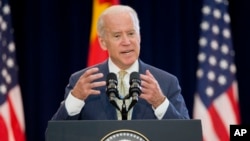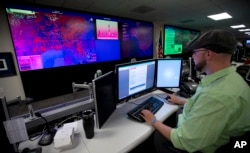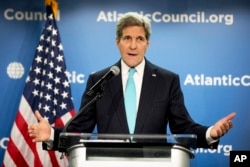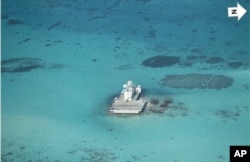U.S. Vice President Joe Biden, while being frank about differences between Washington and Beijing, said the world depends on the mutual success of the U.S. and China to work through issues.
In opening the annual U.S.-China Strategic and Economic Dialogue, Biden said, "We are not going to solve all of these problems in this meeting ... but we have to be committed to working towards solutions."
U.S. and Chinese officials began two days of Cabinet-level discussions on security Tuesday, billed as an opportunity to boost cooperation on global challenges such as climate change and counterterrorism, while addressing their disagreements, including China's island building in the disputed South China Sea.
In equally frank comments, Chinese Vice Premier Wang Yang agreed the world's two leading economies do not agree on everything, admitting "on some issues consensus still eludes us."
But, Wang stressed, "dialogue is always more preferable than confrontation. ... China and (the) U.S. must not follow old paths of confrontation and conflict."
Warning over seaways
While not glossing over differences between the nations, Biden praised China for being "a partner" on many issues from nuclear negotiations to climate change.
However, he delivered a sharp warning to Beijing amid territorial disputes with Asian neighbors over the South and East China Seas, saying the world's waterways must remain "open and protected" for trade.
"Responsible countries adhere to international law and work together to keep international sea-lanes open for unimpaired commerce," Biden said. "Eighty percent of all the commerce today is on the back of a ship somewhere floating on the oceans.
"The notion of sea lanes being open and protected is even more crucial today than any time in human history, because of the interconnectiveness of the world," he added.
The two countries remain at odds over Beijing's claims to much of the South China Sea and Washington has repeatedly urged an end to China building artificial islands in the area. However, China said last month it will project its military power further beyond its borders at sea and more assertively in the air.
'Very direct' conversations
Earlier Tuesday, U.S. officials promised a "very direct" conversation with Chinese officials during thea high-level dialogues that continue Tuesday in Washington.
Among the topics expected to be raised during the meetings are cybersecurity, China's disputed maritime claims and bilateral efforts to combat climate changes.
The talks opened Monday with a series of wide-ranging Strategic Security Dialogue meetings, which a senior State Department official described as frank.
"They've been candid and to the point in dealing with issues where we disagree and are very good for trying to find ways to narrow our differences on these most sensitive issues in the relationship," the official said.
China's official Xinhua news agency said the two sides held an "in-depth exchange of views on issues of common concern" and said they agreed to continue working to promote trust and improve relations.
U.S. Secretary of State John Kerry and Treasury Secretary Jacob Lew joined Wang and State Councilor Yang Jiechi at Tuesday's broader U.S.-China Strategic and Economic Dialogue.
Cyber concerns
One source of recent U.S.-China tensions is cybersecurity, an issue the State Department official said "will certainly be talked about in very direct terms."
The U.S. is investigating a massive cyberattack that targeted the private records of about 4 million current and former federal government employees.
Investigators said it appears the attack began last year, although it was not detected until two months ago.
The U.S. government has not openly accused China of being behind the hack. However, officials have said an investigation is underway to determine if there is a China link.
A senior State Department official said the U.S. and China have had ongoing discussions about “all of the various aspects of cybersecurity.”
“The issue will be addressed in pretty direct terms with the Chinese,” the official said.
Chinese Foreign Ministry spokesman Lu Kang said Internet security was something that the international community needed to face together as it was a common problem.
"China and the United States had previously always had a good dialogue mechanism on issues of Internet security. Because of reasons that everyone knows about, and not because of China, this dialogue has stopped," Lu said.
The U.S. and China do not always agree on the approach to cybersecurity and cyber defense, said State Department spokesman John Kirby.
“It is certainly one of those areas where there is room for better cooperation, better dialogue and more transparency,” Kirby said.
Climate initiatives
On Monday, Energy Secretary Ernest Moniz outlined a series of collaborative efforts between the U.S. and China on climate change, including a Carbon Capture Utilization and Storage project.
The renewable energy project involves capturing carbon dioxide emissions from sources such as coal plants with a goal of either reusing the emissions or storing them so that they do not enter the atmosphere.
“The United States and China continue to lead the drive to press our clean energy ambition further, both in our countries and globally,” said Moniz.
At the same session on Monday, China’s Special Representative for Climate Change, Xie Zhenhua, said the U.S. and China could have a significant impact on climate change at the bilateral and multilateral levels.
South China Sea building
One of the thornier issues the U.S. will raise with China is Beijing’s construction activity in disputed regions of the South China Sea.
The U.S. voiced concern that China’s construction on islands and reefs may restrict movement of foreign vessels and planes. China has said its construction is “lawful.”
“It is not about accepting the status quo,” Kirby said.
He said the U.S. had made clear its concerns about the land reclamation activities and the militarization of at least some of the islands.
Officials say the three-day dialogue will also help set the stage for Chinese President Xi Jinping’s September visit to Washington.
VOA's William Gallo contributed to this report. Some material came from Reuters and AFP.







